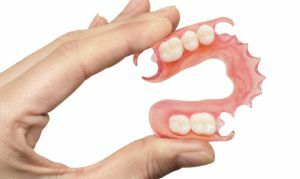 To date, dentists have noted that among all types of prosthetics, soft removable dentures have become popular.
To date, dentists have noted that among all types of prosthetics, soft removable dentures have become popular.
Firstly, this is explained by the possibility of replacing the whole dentition at a very affordable cost, and secondly, with the help of the presented design, partial prosthetics can be performed.
Soft prosthetics is the process of manufacturing a special design, which is presented in the form of using a special soft material acting as a basis.
The structure is attached to the gums by special clamps, which are also made of soft plastic.
Nylon and silicone prostheses are distinguished, which differ material, but are often taken for one type of prosthesis.
Contents
- Why nylon has become a silicone?
- Advantages and disadvantages of soft structures
- Constructional variations
- Installation and care of orthodontic inserts
- Use of nylon with no teeth at all
- A good source of information - patients
- Financial issue
Why nylon has become a silicone?
Simple philistines who have not encountered dental prosthetics believe that nylon and silicone dentures are one and the same.
Such a statement is considered incorrect, because for the production of the presented structures are used completely different materials: for nylon - nylon, for silicone - silicone, and in its chemical composition is absolutely two different materials.
Due to differences in materials, dentists note that silicone prostheses are much softer than nylon. A mistake has gone through using the Internet, where most of the information is provided by programmers, and not by specialists in the dental field.
The difference is visible to the naked eye - in the photo from the top down nylon and silicone dentures:
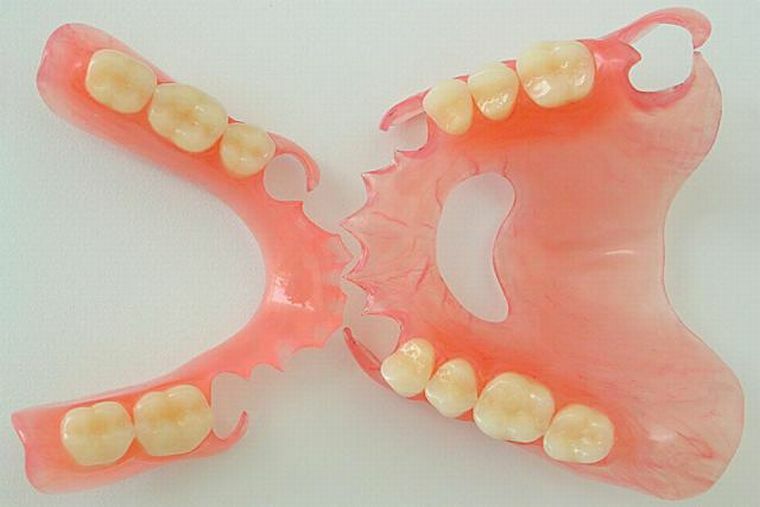
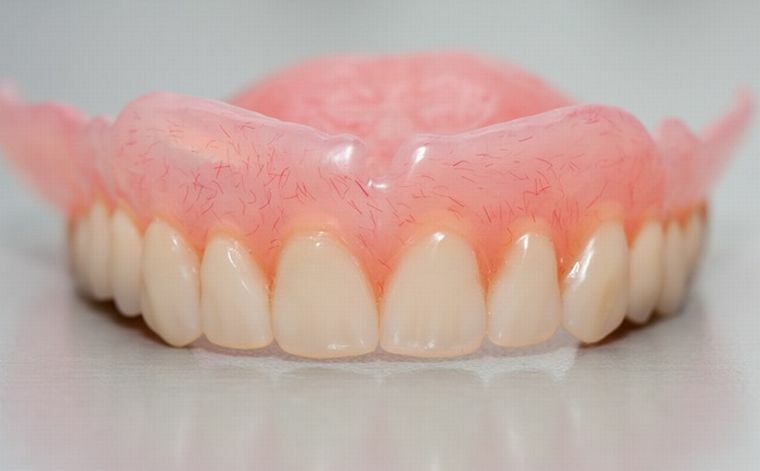
Advantages and disadvantages of soft structures
The main advantage of soft prostheses is that both nylon and silicone prosthesis can be installed with no teeth or partial teeth.
It should also be noted that the basis is consistent with the natural color of the gums, which makes the smile aesthetic and attractive.
Unlike other types of prostheses, soft have the following positive qualities and characteristics:
- Possibility of use in the presence of an allergic reaction to metals .
- Soft designs are flexible and long-lasting , because they do not break and keep the shape for a long time.
- Flexible prosthesis is well fixed ( similarity of gluing).If necessary, you can use a special adhesive for the
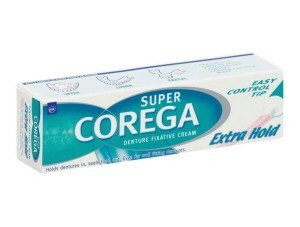 better effect.
better effect. - No additional procedures are required for use( turning or coating with additional material).
- Easy to use and maintain .Periodic soaking of the prosthesis in the solution helps to get rid of the unpleasant odor and characteristic plaque.
- Prostheses do not require additional correction of , because they differ by exact measurement.
- Basis material is impact-resistant and can break only when exposed at right angles.
- Prostheses are very soft and do not rub gums.
- It does not require a long-term installation of , followed by healing of wounds on the gums.
Among the shortcomings can be identified the following aspects:
- such prostheses are characterized by uneven masticatory load of , which at the initial stage of use can lead to inflammatory process;
- these designs can not be cleaned with usual brushes and pastes - so you can scratch the surface, and in scratches there will be a long lasting odor of decaying food;
- with prolonged use of , bone atrophy of is noted;
- under condition of breakage nylon and silicone prosthesis can not repair - it is necessary to order a new design.
Constructional variations of
Flexible prostheses differ in design features. So, nylon or silicone dentures are: 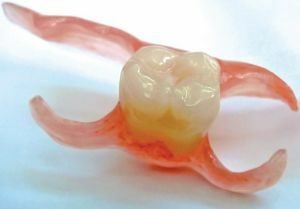
- Partial - are more often made of nylon and are characterized by a partial restoration of the dentition. The basis of such structures passes through the entire alveolar process and artificial teeth are located only where they are needed.
- Complete designs completely replace the upper or lower dentition. There are models that are mounted on the supporting painters, but in spite of the partial covering of the dentition, they are also referred to as full prostheses.
The choice of the type of prosthesis depends on the condition of the oral cavity.
Installation and care of orthodontic inserts
The rules for the use of elastic prostheses are quite simple. It should only clean the mouth with a special solution and put on the design, fixing it with the help of an existing attachment.
It is better to use special glue if you are afraid for the reliability of fastening and aesthetics. Pay attention to the care of dentures and the oral cavity, in particular.
The following rules should be followed:
- At first, in order to get used to its new state and maintain the integrity of the structure for a long time, should not eat solid foods, and also viscous consistency such as toffee and sweet nougat.
- You can gradually switch from liquid food and cereals to harder consistencies, but is not recommended to use nuts, crackers and other similar solid products.
- To clean dentures, dentists advise using special tablets , for example, Protefics. This product perfectly cleans the denture, removing it from an unpleasant odor, plaque and disinfecting the structure.
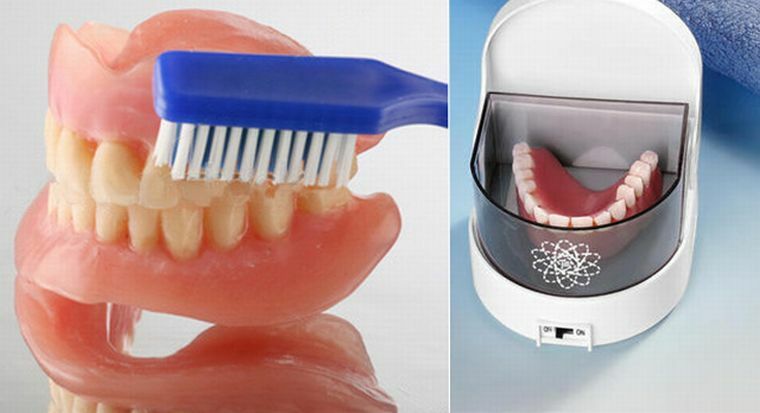
Use of nylon in the complete absence of teeth
There are also cases when a person has a complete absence of teeth. Often such patients at a dentist's reception ask questions about the manufacture of nylon prostheses. Theoretically and practically this is possible, although the manufacture of such a construction will take a long time, and also require large amounts of money.
Yes, nylon is soft and comfortable to wear, but not for its full use. Therefore, experts recommend giving preference to more rigid designs.
As for nylon prosthetics with full adentia, the following unpleasant moments should be highlighted:
- A person because of the softness of the material will experience discomfort during eating .So, the entire load of
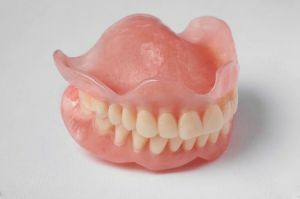 is directed at the gums, which gradually begin to ache and bleed due to the formation of wounds.
is directed at the gums, which gradually begin to ache and bleed due to the formation of wounds. - Despite the wide choice of adhesive substances, such designs do not differ in the excellent fixation of , which causes psychological discomfort - the consumer seems that his appearance is not aesthetic, and the "jaw" can fall out at any moment.
- This kind of prosthetics requires frequent replacement of structures. All this threatens to subsidence of the jaw, which for the year decreases by 1 mm. As a result, patients turn to dentists every 2 years to make a new design, and this is financially difficult.
Despite the warnings of specialists, there are a large number of patients who prefer nylon prosthetics.
A good source of information -
patients To finally clarify the situation and find out what are the pros and cons of nylon and silicone dentures, it will be useful to study the reviews of patients in dental clinics.
I lost my teeth two years ago because of the development of periodontal disease. After consultation, the dentist decided to use soft dentures.
I needed partial prosthetics, because 4 teeth in the bottom row and 6 in the upper one could be saved. Many people warned about nylon prostheses, but I preferred them. Half a year was required for habituation, but this is due to psychological discomfort, otherwise it was used to new teeth after 2 weeks.
Irina Belugina, 42, Novocherkassk
I have been using prostheses for 20 years. How many of them I could not count. The last 5 years I used acrylic. I thought that everything was fine, but after I decided to make a nylon design, I realized that there was consumer goods before! These nylon inserts were much more convenient, do not rub, they got used to quickly. I like.
Stepan Mishurin, 61, Astrakhan
I like the nylon construction, although I feel that it is necessary to change - it is too big steel. But with this specimen passed the year 4. So it's normal, still half a year will last.
Philip Klimushkin, 54, Novosibirsk
Financial issue
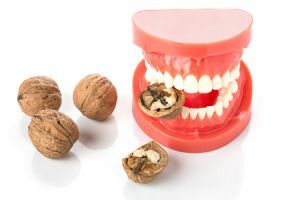 The price of installation of nylon and silicone prostheses directly depends on the quality of the material and the status of the clinic in which the construction will be made.
The price of installation of nylon and silicone prostheses directly depends on the quality of the material and the status of the clinic in which the construction will be made.
The cost can vary from 13 to 40 thousand rubles for one prosthesis. But do not think that the higher the cost, the better the product.
The main thing in this matter is the skill of the dental technician, who must take all the measurements correctly and carefully, and also make a tab in accordance with the measurements and the minimum error.
Soft prosthetics only looks at first glance as a non-aesthetic option, but in fact, it is often much better than other methods of prosthetics that can harm gums, and if an error is made by the dental technician, it will cause great inconvenience in future use.
